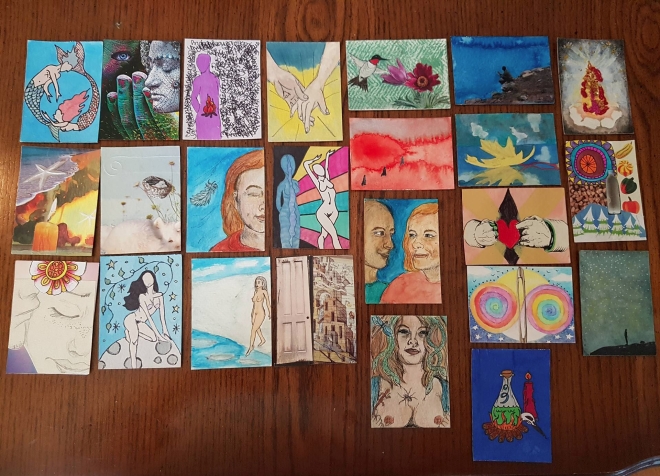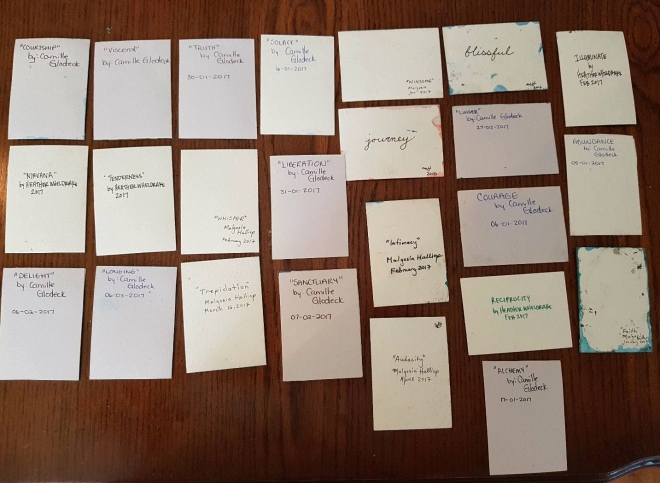After the American election last November, in the bleakness of the weeks that followed, I found myself making tiny collages and drawings for myself and to send to friends. Three of us started a small reciprocal putting-things-in-the-mail project of assigning words to each other – courage, tenderness, delight, solace, trepidation, audacity – to illustrate on a tiny and highly intimate scale. We mailed them back and forth for months. Something about the miniature acts of creation centered me, kept my hands busy, kept my mind healthy, perhaps reminded me that small gestures can have large meaning, especially when they weave relationships together, especially when they keep us afloat in a storm.
More recently, I’ve become infatuated with poetry: reading it, writing it, reading about writing it. There is something about conciseness, an oblique perspective, and the need to speak through image instead of argument that is compelling to me. It feels like a particular kind of magic that I want to draw towards myself, that I want to take in and also to birth. It’s no less work than writing an essay, but it’s a very different kind of work. It’s a work of compression rather than expansion. It is a form of translation: of the language of the heart into the language of the intellect and then back again. It is also, for me, a small stone tossed into the enormous pool of human words, confessions, arguments, and opinions, a gesture that often feels more natural to my way of being than further filling up the pool itself. As Denise Levertov wrote, poetry is a way to “awaken the sleepers by means other than shock.” Or, as Jane Hirshfield so brilliantly puts it:
Not for poetry the head-on meeting of inquiry and object found in the essay, the debate, or the letter to the editor. A poem circles its content, calls to it from afar, looks for the hidden, tangential approach, the truth that grows apparent only by means of exile’s wanderings, cunning’s imagination, and a wide-cast, attentive silence. Poems do not make appointment with their subjects – they stalk them, keeping their distance, looking slightly off to one side. And when at last the leap comes, it is most often also from the side, the rear, an overhead perch, from some word-blind woven of brush or shadow or fire.
I think about this often, the large and the small, the direct and the tangential. I think about the idea, one I’ve heard proclaimed by several people as a personal vision, that we should each aim to make the biggest difference to the largest number of people possible. I can’t really argue with this goal, but the first time I heard it, I felt my heart sink. Clearly, as a mother with small children – albeit now larger – whom I had decided to homeschool for an undetermined length of time, I had abdicated this kind of heroic vision for myself. My influence might arguably go deep, I thought, but it would not be cast wide.
As a voracious reader and follower of internal tangents, I recently became absorbed in reading fairy tales, fascinating maps of human development and age-old troves of insight. One thing I was reminded of – which in youth would have made me want to scream, but in early middle-age I find highly reassuring – is how often the individual path to heroic goals leads through a lot of very minute tasks: the separating of poppy seeds from sand, the plucking of a tail feather from every bird in the world. Or sometimes a commitment to years of repetitive work required in order to move on to the next stage of the journey. The heroic journey rarely looks heroic in the middle of things. It is ordinary, repetitive, slow: very much about showing up and doing the work, very much about patience.
And the repetitive tasks themselves, of course, can only be accomplished with help. Beware anyone on the heroic path who turns aside from the smallest request from the smallest creature – the ant, the bee, the bird, the fish. In the fairy tale world, stepping off the path to help is always the right choice. Without the turn off the path to answer the call for help, without the reciprocal relationships that are birthed from generosity, the impossible tasks encountered later on the path would remain impossible. The heroic journey so often emerges out of making a difference to one small creature at a time. It’s the reciprocity, the collaboration formed in those small connections, that makes room for creative and intuitive shortcuts that unlock the gates of the most impossible tasks.
I think about this when I attempt to be single-minded. “I’m going to be a writer. Seriously,” I say to myself, and so I cut down on outside commitments, I attempt to keep my focus, I disengage a little from the world. And I do increasingly believe that to be of service in the world comes not out of being always available to outside requests nor out of other people’s sometimes limited definitions of one’s abilities, but from a place of discernment deep within that knows what ignites us and what delights us and what is our own particular gift to share. In other words, good boundaries, clarity of vision, and abundant self-knowledge. And what is separating poppy seeds from sand all about if not discernment?
That doesn’t, however, account for the ongoing moral need to keep stepping off the path. Stepping off the path to stay engaged with what is needed in the wider world. Engaged and alert and responsive, but not obsessed, not so overwhelmed that we forget our path entirely. And yet stepping off the path is a crucial part of the story; without it the story would have no heart. Stepping off the path is in the end what makes the necessary discernment possible. It’s what brings us into the interdependence that will make the story whole, that will make us whole, that maybe – maybe – will make the world whole.
What I see for myself as I chew over these questions is the need to take things step by step, to start with what and who is nearest to me and let those actions ripple outwards. I don’t believe that it is always easiest to be kind to those who are closest to you, to those who share your DNA, your home, your table, your neighbourhood. Sometimes it’s the hardest thing. And that small-scale kindness, if it is maintained with intention, context, and an outward eye into the world and its needs, has its impact. Compassion ripples outward.
There’s a balance that I am constantly looking for between the shouting of the online world, which I sometimes mistake for a required form of civic engagement, and withdrawal from it. Some balance which uses the tools of modern life in ways that are generative and meaningful. Some balance that allows me to continue to speak in my own elliptical voice with its own particular clarity, instead of requiring me to adopt the linear language of argument. Some balance that focuses on the good and the beautiful, but is not afraid to look the shadows of hate in the face and call them out by name. Some balance which attempts to locate itself in small, real-life encounters and relationships, in small-scale acts of creation, in loving gestures, in patience, in intentional conversations with strangers, in being available to friends and neighbours, in being deeply at home in the more-than-human world. In sum, in that foundational element of life which is mostly about showing up, wherever and whoever you are.
Our culture sometimes tries to tell us that only large gestures have meaning, that only large voices can be heard. This is a fallacy of individualism, but so is the idea that small gestures that we undertake divorced from context, community, and systemic change can make a difference in a world that is at its core all about interdependence. Small-scale gestures in relationship, repeated, multiplied, passed on, rippling outward, set down the stitches and repair the tears so that larger tapestries of healthy communities and cultures can emerge.
Perhaps it also helps to take an ecosystem view: what have we learned about the cascade effect of taking any element out of the system, out of the complex web of relationships that is tightly and perfectly woven, each piece depending on all of the others? I remind myself that whatever my small piece is – and humans have so much more trouble inhabiting this than other creatures – I need to root myself in it. That small piece is, in some way, absolutely necessary to the whole.
I insist on radical hope in myself, even when in my Eastern European moments of fatalism I wonder how long this can all last, everything our culture takes for granted. I try not to take any of it for granted. I try to be absolutely clear with myself where the privilege is in my life, where the gifts, what I need to heal to keep the ripples moving outward in ways that are generative and healthy to myself and others. The piece I hold is not too small; the piece you hold is not too small. But let’s keep connecting them. We need to keep trusting each other to love the world and everything in it, and to keep doing the things that need to be done, with discernment and generosity, courage and tenderness. That is the most and the least we can do.

Images by Malgosia Halliop, Camille Glodeck, Heather Wheldrake. Photo by Camille Glodeck.

Photo by Camille Glodeck

Great post. I just loved it so much !! 👍😊
Thanks! I’m glad to hear it spoke to you.